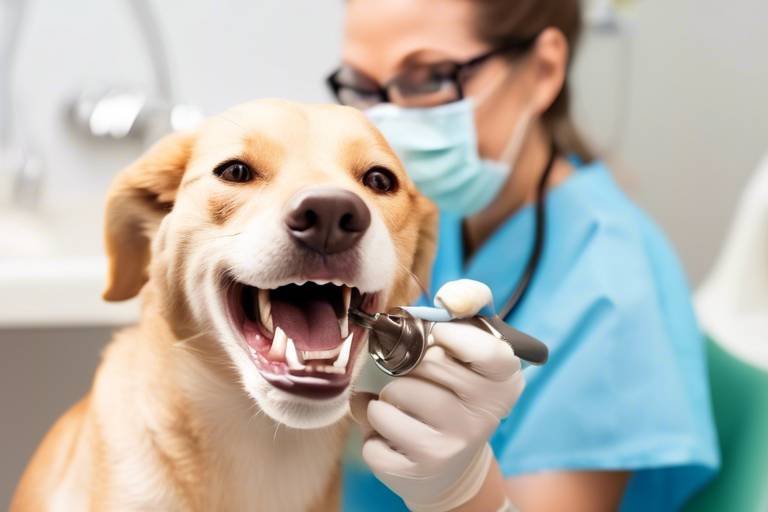How to Identify Symptoms of Heartworm Disease
Heartworm disease is a silent predator lurking in the shadows of pet ownership, and recognizing its symptoms early can make all the difference in your furry friend's health. Imagine your beloved dog or cat, full of life and energy, suddenly becoming lethargic and disinterested in play. This scenario can be alarming, and understanding the signs of heartworm disease is crucial for every pet owner. It's not just about being proactive; it's about ensuring that your pet lives a long, happy, and healthy life. So, let's dive into the world of heartworm disease and learn how to spot the symptoms that could save your pet's life.
Heartworm disease is caused by parasitic worms, primarily Dirofilaria immitis, which reside in the heart and lungs of infected pets. The disease is transmitted through the bite of an infected mosquito, making it a hidden threat in many regions. Once inside the host, these worms can grow up to a foot long and can reproduce, leading to a serious infestation. Over time, the worms can cause severe damage to the heart, lungs, and blood vessels, ultimately leading to heart failure and even death if left untreated. Understanding how heartworm disease operates is the first step in protecting your pet from its devastating effects.
Recognizing the early signs of heartworm disease is crucial for timely intervention. The symptoms can be subtle at first, often mistaken for other common ailments. However, being vigilant and observant can help you catch these signs before they escalate. Here are some key symptoms to keep an eye on:
- Coughing: A persistent cough can be a significant indicator of heartworm disease.
- Fatigue: Noticeable lethargy or decreased activity levels can signal underlying health issues.
- Weight Loss: Unexplained weight changes can be a red flag that something is wrong.
- Behavioral Changes: Any sudden shifts in your pet's behavior should be closely monitored.
A persistent cough is one of the hallmark symptoms of heartworm disease. Initially, it may start as a mild cough, but as the disease progresses, it can become more severe. The reason behind this coughing is the inflammation and damage caused by the worms in the blood vessels of the lungs. Imagine trying to breathe with a heavy weight on your chest—that's how your pet feels when heartworms invade their lungs. It's essential to pay attention to the frequency and severity of your pet's cough, as this can indicate the progression of the disease.
The severity of coughing can vary significantly among pets, indicating different stages of heartworm disease. If your pet's cough is persistent and worsens over time, it’s a clear signal that veterinary help is needed. Assessing the seriousness of your pet's cough involves observing factors such as:
- How often does the cough occur?
- Is it dry or productive (producing phlegm)?
- Does it occur during exercise or at rest?
These observations can help your veterinarian make a more accurate diagnosis and determine the best course of action.
In addition to coughing, pets may exhibit other respiratory issues, such as wheezing and labored breathing. These symptoms can indicate that the heartworm infestation is advancing and affecting your pet's overall health. If you notice your pet struggling to breathe, or if they seem to be gasping for air, it’s imperative to seek veterinary attention immediately. Just like humans, pets can experience severe respiratory distress, and timely intervention can be lifesaving.
Pets suffering from heartworm disease often show signs of fatigue and lethargy. You might notice that your once-active dog is now hesitant to go for walks or play fetch. This decreased energy level can significantly affect your pet's quality of life. Imagine how you would feel if you were constantly tired and unable to enjoy your favorite activities. For pets, this lethargy can stem from the heart and lung strain caused by the presence of worms, making even simple activities feel exhausting.
Unexplained weight loss and changes in appetite are significant indicators of heartworm disease. As the disease progresses, pets may lose interest in food, leading to noticeable weight loss. This can be particularly distressing, as maintaining a healthy weight is crucial for your pet's overall well-being. If you notice your pet eating less or showing signs of weight loss, it’s time to take action. Regularly monitoring your pet's weight can help identify potential health issues early.
Regularly monitoring your pet's weight can help you catch potential health issues before they become serious. Weigh your pet at home or during vet visits and keep track of any fluctuations. If you notice a sudden drop in weight, consider the following tips:
- Weigh your pet weekly or bi-weekly.
- Keep a log of their weight and any changes in appetite.
- Consult your vet if you notice significant weight loss.
Heartworm disease can lead to noticeable behavioral changes in pets. You might see your pet becoming more withdrawn, irritable, or even aggressive. These alterations in behavior can serve as warning signs for pet owners to take action. Just like us, pets can feel unwell, and their behavior often reflects their discomfort. If you notice any sudden shifts in your pet's demeanor, it’s time to consult your veterinarian.
Q: Can heartworm disease be prevented?
A: Yes! Regular preventive medication is the best way to protect your pet from heartworm disease.
Q: How often should my pet be tested for heartworms?
A: It's recommended to have your pet tested annually, especially if they are on preventive medication.
Q: What should I do if I suspect my pet has heartworm disease?
A: Contact your veterinarian immediately for an evaluation and potential treatment options.

Understanding Heartworm Disease
Heartworm disease is not just a minor inconvenience for our furry friends; it’s a serious and potentially fatal condition caused by parasitic worms, specifically Dirofilaria immitis. These worms are transmitted through the bites of infected mosquitoes, which means that any pet that spends time outdoors is at risk. Imagine a tiny invader making its home in your pet's heart and lungs, causing a host of health issues. This is precisely what happens when heartworms take hold in your beloved animal.
The lifecycle of these parasites is quite fascinating yet alarming. When an infected mosquito bites your pet, it injects heartworm larvae into their bloodstream. Over the course of several months, these larvae mature into adult worms, which can grow up to a foot long! They then migrate to the heart and lungs, where they can live for several years, wreaking havoc on your pet's cardiovascular system. The impact on your pet's health can be devastating, leading to severe complications, including heart failure and even death if left untreated.
Heartworm disease primarily affects dogs, but cats are also at risk, albeit to a lesser extent. In dogs, the symptoms can be more pronounced, making it easier for owners to recognize when something is wrong. However, in cats, the signs can be subtler, which is why it's crucial for pet owners to be vigilant and proactive. The earlier you can detect the disease, the better the chances for successful treatment.
Understanding heartworm disease is essential for any pet owner. Here are some key points to keep in mind:
- Transmission: Heartworm disease is transmitted through mosquito bites, making prevention crucial.
- Symptoms: Early signs can be vague, so regular check-ups are important.
- Prevention: Monthly preventatives are available and highly recommended to keep your pets safe.
In summary, heartworm disease is a significant threat to the health of pets, especially dogs. By understanding how it is transmitted and the potential consequences, pet owners can take proactive steps to protect their furry companions. Regular veterinary visits and preventive measures are key to ensuring that your pet remains heartworm-free. Remember, knowledge is power, and being informed can make all the difference when it comes to your pet's health!

Common Symptoms to Watch For
Recognizing the early signs of heartworm disease is crucial for the health and well-being of your beloved pets. Just like a smoke alarm alerts you to danger before a fire spreads, being aware of these symptoms can help you catch the disease early and seek veterinary care promptly. Heartworm disease often creeps up on pets, and by the time symptoms are noticeable, the condition may have progressed significantly. So, what should you be on the lookout for?
One of the most common symptoms is a persistent cough. This isn't just a regular cough; it's a sign that something is amiss. As the heartworms grow and multiply in your pet's body, they can cause inflammation in the lungs and surrounding tissues. This leads to that annoying cough that just won't go away. If your furry friend seems to cough frequently, especially during exercise or excitement, it's time to pay attention.
When it comes to coughing, the severity can vary greatly. Some pets may experience a mild, intermittent cough, while others might have a severe, hacking cough that leaves them gasping for breath. This variation can indicate different stages of heartworm disease. If you notice your pet coughing more than usual, it’s essential to assess the situation. Ask yourself: Does the cough sound dry or wet? Is it accompanied by wheezing or labored breathing? These details can help your veterinarian determine the next steps.
To help you gauge the seriousness of your pet's cough, consider keeping a journal of when the coughing occurs and any other accompanying symptoms. This can be a valuable tool for your vet. If you find that your pet's cough worsens over time or is accompanied by other alarming symptoms like lethargy or difficulty breathing, don’t hesitate to seek veterinary assistance. Early intervention can make all the difference in treatment outcomes.
Alongside coughing, there are other respiratory symptoms that can indicate advanced heartworm disease. These include wheezing, which sounds like a high-pitched whistle when your pet breathes, and labored breathing, where your pet may appear to be struggling for air. If you notice any of these signs, it's a clear signal that your pet needs immediate attention.
Another critical symptom to watch for is fatigue and decreased activity levels. If your once-playful pup or curious kitty seems to be less interested in their favorite activities, it could be a sign that they’re feeling unwell. Heartworm disease can lead to a significant drop in energy levels, making even simple tasks like going for a walk seem daunting. This lethargy can affect your pet's quality of life, so it’s essential to monitor these changes closely.
Unexplained weight loss and changes in appetite are significant indicators of heartworm disease. When heartworms invade your pet's body, they can cause a range of metabolic changes that lead to weight loss, even if your pet is eating normally. It’s as if they’re in a constant battle, and their body is losing the fight. If you notice that your pet is dropping weight without any change in their diet or activity level, it’s time to take action.
Regularly monitoring your pet's weight can help identify potential health issues before they escalate. A simple way to do this is by weighing your pet weekly or bi-weekly. Keep a record of their weight in a notebook or on your phone. If you notice a trend of weight loss over a few weeks, consult your veterinarian. They can perform tests to determine if heartworm disease or another issue is at play.
Finally, heartworm disease can lead to noticeable behavioral changes in pets. You might find that your pet is less social, more irritable, or simply not themselves. It’s essential to pay attention to these changes, as they can serve as warning signs for pet owners. Just like we might feel off when we're sick, our pets can exhibit similar signs. If you notice your pet acting differently, it’s worth investigating further.
- What is heartworm disease? Heartworm disease is a serious condition caused by parasitic worms that live in the heart and lungs of infected pets.
- How is heartworm disease transmitted? Heartworm disease is primarily transmitted through the bite of an infected mosquito.
- What are the treatment options for heartworm disease? Treatment options vary depending on the severity of the disease and may include medication and, in severe cases, surgery.
- How can I prevent heartworm disease in my pet? Regular use of heartworm preventive medication is key to keeping your pet safe from this disease.
Coughing and Respiratory Issues
Coughing is not just a trivial inconvenience; it can be a serious indicator of heartworm disease in your beloved pet. When heartworms invade the bloodstream, they take up residence in the heart and lungs, causing a range of respiratory issues. Imagine a tiny army of parasites marching through your pet's veins, creating chaos and discomfort. This is why understanding the nature of your pet's cough is crucial. A persistent cough can often be one of the first signs that something is amiss, and it’s essential to pay close attention to its characteristics.
So, why exactly does coughing occur in pets suffering from heartworm disease? As the worms grow and multiply, they can cause inflammation in the lungs and blood vessels. This inflammation can lead to a narrowing of the airways, making it difficult for your pet to breathe comfortably. Think of it like trying to breathe through a straw; the more obstructions there are, the harder it is to get air in and out. If you notice your pet coughing frequently, especially after exercise or during the night, it’s a signal that you should consult your veterinarian.
Moreover, the severity of coughing can vary significantly among pets, and this variation can indicate different stages of the disease. For instance, a mild, occasional cough might not seem alarming, but if it progresses to a harsh, dry cough that occurs regularly, it could mean that the heartworm infestation is becoming more severe. Recognizing these differences can be a lifesaver. It’s essential to monitor how often your pet coughs and in what situations. Here are some examples of coughing severity:
| Type of Cough | Severity Level | Possible Stage of Heartworm Disease |
|---|---|---|
| Mild, Occasional Cough | Low | Early Stage |
| Frequent Dry Cough | Moderate | Mid Stage |
| Severe, Persistent Cough | High | Advanced Stage |
In addition to coughing, pets may exhibit other respiratory symptoms that can signal advanced heartworm disease. These symptoms may include wheezing, which sounds like a whistle when your pet breathes, and labored breathing, where your pet seems to struggle for air. If you observe any of these symptoms, it’s crucial to seek veterinary care immediately. Remember, the earlier you catch heartworm disease, the better the chances for successful treatment. Just like a fire, the longer you let it burn, the harder it is to extinguish.
In summary, if your pet is coughing or showing any signs of respiratory distress, don't hesitate to reach out to your veterinarian. Early detection and treatment can make all the difference in your pet’s recovery and overall health. After all, our furry friends rely on us to keep them safe and healthy!
Severity of Coughing
Coughing in pets, especially dogs, can be a significant indicator of heartworm disease, and understanding the severity of this symptom is crucial for timely intervention. When assessing your pet's cough, it's essential to consider not just the frequency but also the intensity and characteristics of the cough. A mild, occasional cough might not raise immediate concern, but if your furry friend starts to cough persistently, it could indicate that the heartworms are causing more serious issues.
To help you gauge the severity of your pet's coughing, here are some key points to consider:
- Frequency: Is your pet coughing sporadically or multiple times throughout the day?
- Sound: Is the cough dry and hacking, or is it moist and productive?
- Duration: Has the cough lasted for more than a few days without improvement?
Understanding these factors can help you determine whether your pet's cough is a simple irritation or a more serious concern related to heartworm disease. For instance, a dry cough may suggest irritation in the airways, while a moist cough could indicate fluid in the lungs, a sign of advanced heartworm infection. It's essential to observe any accompanying symptoms, such as lethargy or difficulty breathing, as these can further indicate the severity of the condition.
If you notice that your pet's cough is becoming more frequent and severe, it’s time to consult your veterinarian. Early diagnosis and treatment can significantly improve your pet's chances of recovery, making it vital to pay close attention to these changes. Remember, a pet's cough is not just a minor annoyance; it can be a cry for help, signaling that something is wrong beneath the surface.
Other Respiratory Symptoms
When it comes to heartworm disease, a persistent cough is often the first sign that pet owners notice. However, coughing is just the tip of the iceberg. As the disease progresses, you may observe other concerning respiratory symptoms that can indicate a more serious condition. For instance, pets may experience wheezing, which is a high-pitched sound produced during breathing and can be quite alarming to hear. This wheezing often results from the narrowing of the airways caused by the presence of heartworms in the pulmonary arteries.
Moreover, pets might also show labored breathing. This means that your furry friend is working harder than usual to breathe, which can be a distressing sight for any pet owner. You might notice that your pet's abdomen rises and falls more rapidly than normal, or they may even adopt a posture that makes breathing easier, such as stretching their neck forward or sitting up more than usual. These signs are not just minor inconveniences; they can indicate that the heartworms are causing significant damage to your pet's lungs and heart.
To help you better understand these symptoms, here's a quick overview of some other respiratory issues that may arise with heartworm disease:
| Symptom | Description |
|---|---|
| Wheezing | A high-pitched sound during breathing, often due to narrowed airways. |
| Labored Breathing | Increased effort in breathing, noticeable through rapid abdominal movements. |
| Excessive Panting | Panting more than usual, even when at rest, indicating distress. |
If you notice any of these symptoms in your pet, it's crucial to act quickly. Early intervention can make a huge difference in the outcome of heartworm disease treatment. Don't hesitate to consult your veterinarian, as they can provide a thorough examination and recommend the best course of action. Remember, the sooner you catch these symptoms, the better the chances are for your pet's recovery.
- What should I do if I notice symptoms of heartworm disease in my pet?
If you observe any symptoms, it's essential to contact your veterinarian immediately for an evaluation.
- Can heartworm disease be prevented?
Yes! There are several preventive medications available that can help protect your pet from heartworm disease.
- How is heartworm disease diagnosed?
Diagnosis typically involves blood tests, X-rays, and sometimes ultrasounds to assess your pet's heart and lungs.
Fatigue and Decreased Activity
When it comes to heartworm disease, one of the most noticeable symptoms pet owners often observe is a marked increase in fatigue and a decrease in overall activity levels. Imagine your once-playful pup, who would leap at the chance to chase a ball or explore the backyard, now lying around, seemingly uninterested in their favorite activities. This change in behavior is not just a phase; it can be a significant indicator that something is seriously wrong. Pets suffering from heartworm disease often feel lethargic because the disease affects their heart and lungs, making even normal activities feel exhausting.
As heartworm disease progresses, the parasitic worms can cause severe damage to the heart and lungs, leading to poor circulation and oxygen supply. This results in pets becoming easily fatigued after light exercise. You might notice that your dog struggles to keep up during a walk or that your cat prefers to nap rather than engage in play. Such changes can be alarming, especially since pets are often masters at hiding their discomfort until it becomes too severe to ignore.
It's essential to recognize that the degree of fatigue can vary. Some pets may show mild signs of tiredness, while others may seem completely drained. This is where keen observation becomes crucial. Here are a few things to watch for:
- Reluctance to Exercise: If your pet suddenly shows little to no interest in walks or playtime, it could be a sign of underlying health issues.
- Excessive Sleeping: While pets love their naps, if your furry friend is sleeping significantly more than usual, it might be time to consult your veterinarian.
- Shortness of Breath: If your pet seems to struggle to catch their breath after minimal exertion, this is a serious red flag.
Understanding these signs can help you take action early. If you notice your pet displaying any of these symptoms, it’s vital to schedule a veterinary appointment as soon as possible. Early detection and treatment of heartworm disease can lead to better health outcomes and can ultimately save your pet’s life.
In conclusion, fatigue and decreased activity are not just signs of getting older; they can be critical indicators of heartworm disease. By staying vigilant and observant, you can help ensure your pet receives the care they need in a timely manner.
- What should I do if I suspect my pet has heartworm disease? If you notice any symptoms, such as fatigue or coughing, contact your veterinarian for an evaluation.
- Can heartworm disease be prevented? Yes, there are effective preventive medications available. Consult your vet for the best options for your pet.
- How is heartworm disease treated? Treatment typically involves medication to kill the adult worms, but it can be risky and should be managed by a veterinarian.

Weight Loss and Appetite Changes
When it comes to heartworm disease, one of the most alarming symptoms that pet owners may notice is unexplained weight loss. This can be particularly distressing because it often occurs without any obvious changes in diet or activity level. Just like humans, pets can experience a range of health issues that manifest through their eating habits and physical appearance. If you notice your furry friend looking a little leaner than usual, it’s essential to take a closer look at their eating habits and overall health.
Heartworm disease can lead to a decrease in appetite, which may be attributed to several factors. For instance, the presence of heartworms can cause discomfort and pain, making pets less inclined to eat. Additionally, the body’s energy is diverted to fighting off the infection, resulting in fatigue and a lack of interest in food. If your pet seems to be eating less or showing signs of weight loss, it’s crucial to monitor these changes closely. An effective way to track their eating habits is by keeping a daily log of their meals, noting any changes in their appetite or food preferences.
Here are some key signs to look out for when monitoring your pet’s weight and appetite:
- Sudden changes in food intake, such as refusing to eat or eating significantly less than usual.
- Visible weight loss, which can often be assessed by feeling your pet’s ribs or spine—if you can easily feel these bones, it may indicate a concerning weight loss.
- Changes in behavior, such as increased lethargy or withdrawal from playtime and social interactions.
Regularly weighing your pet can also be a helpful practice. If you notice a weight drop of more than 10% over a short period, this could be a red flag. You can easily monitor your pet's weight at home using a scale. Weigh yourself first, then hold your pet and weigh again. The difference will give you your pet's weight. This simple routine can help you catch potential health issues early.
In addition to weight loss, heartworm disease can lead to significant changes in your pet's behavior. For instance, a pet that once eagerly awaited mealtime might start to show disinterest. This alteration can be a signal of underlying health problems that warrant immediate veterinary attention. It's essential to remember that these symptoms can escalate quickly, so early detection and intervention are key to ensuring your pet's well-being.
What should I do if I notice weight loss in my pet?
If you notice any significant weight loss in your pet, it is crucial to consult your veterinarian as soon as possible. They can perform a thorough examination and run tests to determine the underlying cause.
How can I monitor my pet's appetite?
Keep a daily log of your pet's food intake, noting how much they eat and any changes in their eating habits. This information can be invaluable to your veterinarian.
Are there any specific diets recommended for pets with heartworm disease?
Your veterinarian can provide tailored dietary recommendations based on your pet's health status. Generally, a well-balanced diet rich in nutrients is essential for supporting your pet's recovery.
Can heartworm disease cause permanent damage?
Yes, if left untreated, heartworm disease can lead to severe complications, including damage to the heart and lungs. Early detection and treatment are crucial for minimizing long-term effects.
Monitoring Weight Changes
Keeping an eye on your pet's weight is not just a matter of aesthetics; it's a crucial aspect of their overall health. Just like we humans can notice when our jeans fit a little tighter, pets can also exhibit changes that may indicate underlying health issues, such as heartworm disease. Regular weight monitoring can help you catch these changes early, allowing for prompt veterinary intervention. So, how can you effectively track your furry friend’s weight? Here are some tips to get you started:
- Weigh Regularly: Aim to weigh your pet at least once a month. This frequency helps you notice gradual changes that might otherwise go unnoticed.
- Use a Consistent Scale: Whether it's a pet-specific scale or a regular bathroom scale, make sure to use the same one each time to ensure accuracy.
- Record the Data: Keep a log of your pet's weight over time. This can be as simple as a notepad or a digital app. Tracking trends will help you spot any significant fluctuations.
- Observe Body Condition: Weight alone doesn’t tell the whole story. Assessing your pet’s body condition score (BCS) can provide additional insights. A BCS chart can help you understand whether your pet is underweight, at a healthy weight, or overweight.
In addition to tracking weight, pay attention to any changes in your pet’s eating habits. A sudden decrease in appetite or a shift towards overeating can be significant warning signs. If your pet is losing weight despite eating normally, or if they seem to be gaining weight without any change in diet, it's time to consult your veterinarian. They can perform a thorough examination and possibly run tests to rule out heartworm disease or other health issues.
Remember, weight changes can be subtle. You might not notice your pet has lost or gained a few pounds until it becomes more pronounced. Therefore, being proactive and diligent about monitoring their weight will ultimately help you ensure they live a longer, healthier life. Regular check-ins can be a lifesaver, especially when it comes to conditions as serious as heartworm disease.
What is the ideal weight for my pet?
The ideal weight varies by breed and size. Consult your veterinarian for specific recommendations tailored to your pet’s needs.
How can I help my pet maintain a healthy weight?
Regular exercise, a balanced diet, and portion control are essential. Additionally, regular veterinary check-ups can help monitor their health.
What should I do if I notice sudden weight loss in my pet?
If you observe sudden weight loss, it's crucial to consult your veterinarian immediately. This can be a sign of serious health issues, including heartworm disease.
Can heartworm disease cause weight loss?
Yes, heartworm disease can lead to weight loss as it affects your pet’s overall health and energy levels. Early detection is key to effective treatment.
Behavioral Changes
When it comes to heartworm disease, the symptoms extend beyond the physical realm and can significantly impact a pet's behavior. As caring pet owners, it’s essential to be observant of any shifts in your furry friend’s demeanor. Just like humans, pets can exhibit signs of distress or discomfort when they are not feeling well. Behavioral changes can be subtle at first, but they often serve as critical indicators that something might be wrong. For instance, a once playful pup may suddenly lose interest in games and toys. This can be alarming, especially since it’s not just about a lack of enthusiasm; it can signify that your pet is struggling with the internal battle against heartworms.
One common behavioral change is increased irritability. Pets suffering from heartworm disease may become more sensitive to touch or sound. If your dog or cat, who usually enjoys cuddles, suddenly flinches at a gentle pet, it’s time to take notice. This change can be attributed to discomfort or pain caused by the disease. Additionally, you might observe your pet seeking solitude more often than usual. While some pets enjoy their alone time, a sudden desire to hide or stay away from family activities can be a red flag.
Moreover, you may notice changes in your pet’s sleeping patterns. A pet that used to sleep soundly might start to experience restlessness or difficulty finding a comfortable position. This could be due to the discomfort associated with heartworm disease, which can cause internal stress and anxiety. If you find your pet pacing or unable to settle down, it’s crucial to evaluate their overall health.
To help you better understand these behavioral changes, here’s a quick overview of signs to watch out for:
- Increased irritability: Your pet may snap or growl when touched.
- Isolation: A sudden preference for solitude can indicate distress.
- Restlessness: Difficulty sleeping or pacing can be a sign of discomfort.
- Loss of interest: A decrease in playfulness or enthusiasm for walks.
Being aware of these behavioral shifts is crucial for early detection and intervention. If you notice any of these signs, it’s advisable to consult your veterinarian for a thorough examination. Remember, early diagnosis can significantly improve your pet’s prognosis and quality of life.
Q: What causes behavioral changes in pets with heartworm disease?
A: Behavioral changes can arise from discomfort, pain, or fatigue associated with heartworm disease, leading pets to act differently than usual.
Q: How can I help my pet if I notice behavioral changes?
A: If you notice any changes in your pet's behavior, it’s essential to consult your veterinarian. They can provide guidance and appropriate treatment options.
Q: Are all pets affected by heartworm disease likely to show behavioral changes?
A: While many pets do exhibit behavioral changes, not all will show obvious signs. Regular vet check-ups and monitoring your pet’s behavior are key to early detection.
Frequently Asked Questions
- What is heartworm disease?
Heartworm disease is a serious condition caused by parasitic worms that live in the heart and lungs of pets, mainly dogs and cats. These worms can lead to severe health issues and can even be fatal if not treated promptly.
- How do pets get heartworm disease?
Pets typically get heartworm disease through mosquito bites. When a mosquito bites an infected animal, it picks up the heartworm larvae, which can then be transmitted to other pets through subsequent bites.
- What are the early symptoms of heartworm disease?
Early symptoms of heartworm disease can include a persistent cough, fatigue, decreased activity, and occasional weight loss. These signs may be subtle at first, so it's important to monitor your pet closely.
- How can I tell if my pet's cough is serious?
The severity of your pet's cough can indicate the progression of heartworm disease. If the cough is persistent, worsens over time, or is accompanied by labored breathing, it’s crucial to consult your veterinarian immediately.
- What should I do if I notice changes in my pet's appetite or weight?
If you observe unexplained weight loss or changes in your pet's appetite, it's essential to take action. Regularly monitor their weight and consult your vet for a thorough examination to rule out heartworm disease or other health issues.
- Can heartworm disease be treated?
Yes, heartworm disease can be treated, but early detection is key. Treatment typically involves a series of injections to kill the adult worms, along with supportive care to manage symptoms. Always consult your veterinarian for the best course of action.
- How can I prevent my pet from getting heartworm disease?
The best prevention against heartworm disease is to use veterinarian-recommended heartworm preventatives. These medications are usually given monthly and are effective in keeping your pet safe from this potentially deadly disease.
- Is heartworm disease contagious to other pets or humans?
No, heartworm disease is not contagious. It can only be transmitted through mosquito bites, so your pet cannot spread it to other animals or humans directly.



















